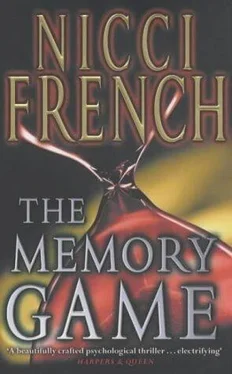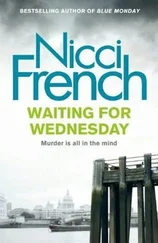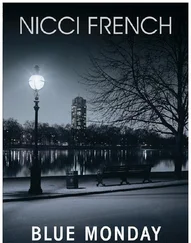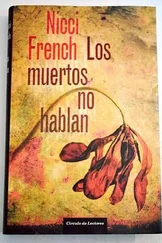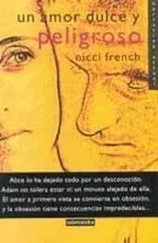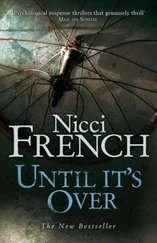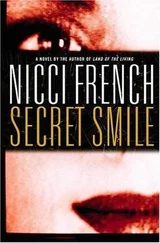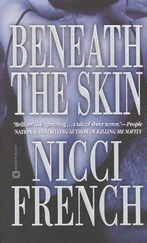Nicci French - The Memory Game
Здесь есть возможность читать онлайн «Nicci French - The Memory Game» весь текст электронной книги совершенно бесплатно (целиком полную версию без сокращений). В некоторых случаях можно слушать аудио, скачать через торрент в формате fb2 и присутствует краткое содержание. Жанр: Триллер, на английском языке. Описание произведения, (предисловие) а так же отзывы посетителей доступны на портале библиотеки ЛибКат.
- Название:The Memory Game
- Автор:
- Жанр:
- Год:неизвестен
- ISBN:нет данных
- Рейтинг книги:4 / 5. Голосов: 1
-
Избранное:Добавить в избранное
- Отзывы:
-
Ваша оценка:
- 80
- 1
- 2
- 3
- 4
- 5
The Memory Game: краткое содержание, описание и аннотация
Предлагаем к чтению аннотацию, описание, краткое содержание или предисловие (зависит от того, что написал сам автор книги «The Memory Game»). Если вы не нашли необходимую информацию о книге — напишите в комментариях, мы постараемся отыскать её.
The Memory Game — читать онлайн бесплатно полную книгу (весь текст) целиком
Ниже представлен текст книги, разбитый по страницам. Система сохранения места последней прочитанной страницы, позволяет с удобством читать онлайн бесплатно книгу «The Memory Game», без необходимости каждый раз заново искать на чём Вы остановились. Поставьте закладку, и сможете в любой момент перейти на страницу, на которой закончили чтение.
Интервал:
Закладка:
I looked through the names. There were pages of them.
‘This is extraordinary,’ I said. ‘How did you get all these names? Was there a guest list?’
‘No, we’ve been talking to various members of the family. The most help was from Theodore Martello. I’ve seen him a few times now. He’s got the most amazing memory.’ Was she blushing?
‘He certainly has. There are names here I’ve completely forgotten. I don’t think I’ve seen William Fagles since the party. It says here that the Courtneys now live in Toronto. They were the parents of one of Natalie’s best friends. Can I have copies of these lists?’
‘These are your copies. If you could just have a look through, it may jog your memory. You’ll see that some of the guests are only identified by their first names and you may be able to complete them. You may think of some others as well.’
‘Well, for a start, the Gordon here must be Gordon Brooks. He used to be a friend of the twins.’
‘I haven’t gone through the list with them yet. But just write it in.’
‘It sounds a terribly dull process.’
‘It’s more exciting than what some of the other officers are doing, I can tell you.’
‘Have you talked to Alan yet?’
‘Yes, of course,’ Helen said. ‘Let me show you what I’m reading.’
She reached into her case and pulled out a bright new Penguin edition of The Town Drain.
‘Are you enjoying it?’
‘It’s wonderful. Not that I know very much about literature… but I think it’s terribly funny. Alan Martello’s so grand now, it’s hard to imagine him writing something that’s so… well, disrespectful.’
‘I don’t think he’s really all that grand.’
‘He was quite stern with me when I asked him what he was writing at the moment. You’re quite a family, aren’t you?’
‘People have always seemed to think so. If you’re going to read all the books written by members of the family, you’ll need to take a sabbatical. For a start, there are all the children’s books that Martha has illustrated. They’re quite wonderful, some of them. All the time that Alan was noisily, theatrically blocked with his writing, Martha was steadily and quietly working away.’
‘I think I’ll stick with Alan Martello for the moment. Are the rest of his books good?’
‘There is only one other novel, and a couple of short story collections. Nothing that comes near to matching up to The Town Drain. But don’t dare tell him I said so.’
We chatted for a few minutes about other things. Helen asked me about architecture and I asked her why she’d joined the police. She told me that she’d studied physics at university and then had had a vision of a life spent in a research laboratory and had suddenly rebelled against it. I liked her for that. She drank the last of her coffee.
‘I think I’d better go,’ she said. ‘Once you’ve looked through that, we could meet again, if you like. I’m down in London quite a lot at the moment.’
‘Doesn’t your husband mind?’
‘He works harder than I do.’
I walked with Helen to the top of the stairs. I had to say something. ‘Helen, twenty-five years is a long time. Is there any point to this?’
‘Of course.’
‘I thought you might be able to do a DNA test on the… you know, the baby, but Claud says you can’t after all that time.’
Helen smiled. ‘That’s right.’
‘So there’s no forensic evidence.’
‘There are one or two other possibilities. No substitute for good old-fashioned police work, though. As our Chief keeps telling us. Goodbye, Jane, see you soon.’
My father was refusing to have anything at all to do with the programme. Paul had begged and blustered, and even sent Erica round – bearing bulbs for Dad’s garden as her excuse – to put the case on his behalf. Yet it never occurred to me to turn Paul down.
I biked hurriedly through the damp air that was becoming thin drizzle to the Soho restaurant that Paul had selected. His research assistant was a young woman called Bella – very tall and skinny, with a halo of red hair and large, kohl-rimmed eyes that she kept fixed adoringly on Paul. She smoked acrid cigarettes lighting each one off the one before, drank mineral water and picked at a side salad.
Over poached eggs, I asked Paul who else he was seeing.
‘You know Dad’s not talking to me?’ I nodded. ‘But Alan’s being marvellous. I’ve already had two sessions with him. My God, he can talk. He’s grown his beard and hair longer, you know, and he’s looking gaunt and wild. He quoted poetry at me, and talked a lot about the weakest being the strongest, or something like that, and when he described our summers together it was like hearing a novel being read out.’
I pulled a face. ‘He’s spent the last couple of decades in pubs and restaurants like this, talking his novel away.’
Paul, dipping brown bread into his egg yolk and gulping red wine, took no notice.
‘He wouldn’t really talk much about Natalie, but he gave me some photographs. Martha didn’t exactly say she wouldn’t talk to me, but when I turned on the tape recorder and asked her questions, she just sort of smiled at me – this really sad, wispy smile – and shook her head. She doesn’t look a happy woman, Jane.’
‘She’s ill,’ I said, and then asked, ‘What about the others?’
‘They’ll all talk. Everybody wants to be on television. Theo considers himself real tele-guru material. Alfred and Jonah seem all set. Claud is being helpful.’ He glanced sideways at me and Bella also looked at me with curiosity. ‘It’s going to be interesting, Jane. And big too, I think. We’ll be like the Waltons.’
‘I think I will have some of that wine,’ I said. ‘What are you going to ask me then?’ Bella leant forward and clicked on the tape recorder.
‘Is that all right?’ she asked, but it was a rhetorical question. This was TV. What could I have against it?
It’s strange, alarming really, how we will talk to a tape recorder and a potential audience of anonymous unthreatening millions, the way we won’t, can’t, talk to a friend or a lover. Or a brother. Paul asked me about my memories of the Stead (‘Just tell me them at random, as they occur to you,’ he said), and as the spools on the recorder whirled, and Bella’s pen scratched busily in her notebook, I plucked forth memories I hadn’t known I’d kept. Croquet on the lawn; wild games of tag; expeditions through the woods with Claud being the leader, secret midnight feasts with food pilfered from the Stead’s generous larder, the dribbly, slack-mouthed retriever the Martellos used to have (was Candy his name?), who would jump clumsily into the stream for sticks; raspberries under a green net that we would pick on hot afternoons; jam-making days (gooseberry, blackberry, strawberry, loganberry, damson, plum), stinging sunburn when we would rub lotion into each other’s shoulders; loud lunches when we’d all show off and Alan would egg us on. I remembered early mornings, when the dew was still on the grass, and long evenings, when the grown-ups were eating their supper and we could hear the chink of knives on plates, the murmur of conversation, and we would pull wellingtons on over bare legs and run down the garden to the swing in the great copper beech tree. In these memories, we children moved as one group, the adults were always in the background, and it was always sunny. It wasn’t really what Paul wanted.
‘It’s interesting,’ said Paul, ‘that you’re only remembering when you were very little. What about later, when you were a teenager?’
Suddenly the wine turned sour in my mouth. Why was I going along with this? I wanted to stop it. ‘Do you want to talk about the summer when Natalie disappeared? Is that what you’re focusing on?’
Читать дальшеИнтервал:
Закладка:
Похожие книги на «The Memory Game»
Представляем Вашему вниманию похожие книги на «The Memory Game» списком для выбора. Мы отобрали схожую по названию и смыслу литературу в надежде предоставить читателям больше вариантов отыскать новые, интересные, ещё непрочитанные произведения.
Обсуждение, отзывы о книге «The Memory Game» и просто собственные мнения читателей. Оставьте ваши комментарии, напишите, что Вы думаете о произведении, его смысле или главных героях. Укажите что конкретно понравилось, а что нет, и почему Вы так считаете.
